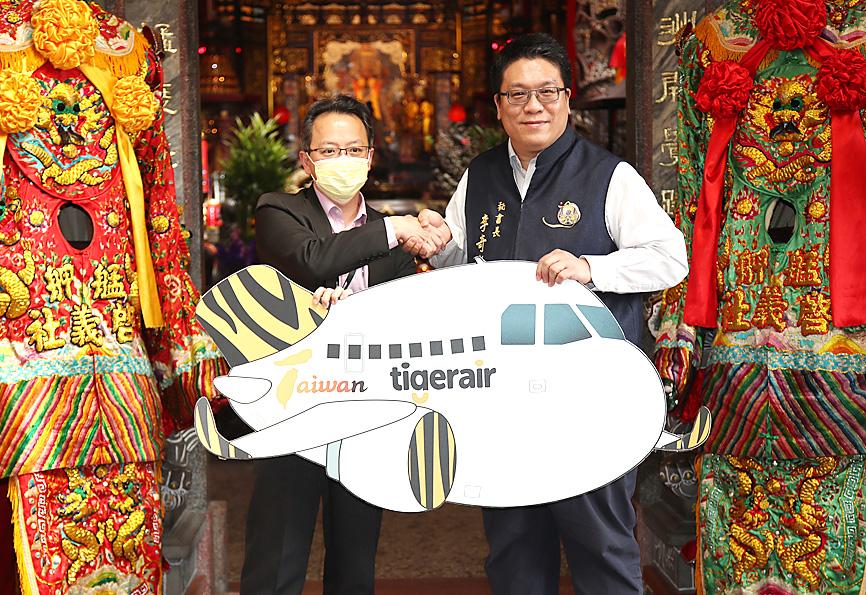A Taiwanese airline and travel agency yesterday announced that they are offering tours to complete Matsu (媽祖) pilgrimages by air, as part of efforts to revive the domestic travel market amid the COVID-19 pandemic.
On May 9, five flights would each take six Matsu statues and 180 people over Taiwan to pray for the country’s fortunes, Chung Hsing Travel Service Co (創新旅行社) chairman Ringo Lee (李奇嶽) said.
The fights, offered by Tigerair Taiwan Ltd (台灣虎航), are to depart from Taiwan Taoyuan International Airport, head eastward and then southward, then they fly over Penghu, Kinmen and Matsu before returning to Taoyuan, Lee said.

Photo: CNA
During the three-and-a-half-hour airborne pilgrimage, passengers would be able to pay tribute to the sea goddess Matsu, one of the most popular deities in Taiwan, he said.
“There will be a ceremony onboard to pray for good luck for Taiwan, particularly amid the challenges of COVID-19 and the country’s water shortages,” said Lee, who initiated the campaign.
He said the idea came to him as he grew up in Penghu, worshipping Matsu.
The annual Matsu pilgrimage — the largest religious procession in Taiwan — usually takes the form of a parade on Taiwan proper and a sea cruise to Penghu, but there is no reason that a new format cannot be introduced, in an attempt to boost the travel market, Lee said.
“The time is just about right, and I do not think it will happen again, because people will not find that much joy in taking a fight to nowhere once Taiwan reopens its borders,” he said.
About 12 renowned temples in Taiwan, including Jenn Lann Temple (鎮瀾宮) in Taichung’s Dajia District (大甲), Fengtian Temple (奉天宮) in Chiayi County’s Singang Township (新港) and Chi Tien Temple (啟天宮) in Taipei’s Wanhua District (萬華), have signed up for the air pilgrimage, Lee said.
Due to strict aviation laws, most of the religious rituals would be held in the airport lounge before departure, he added.
The Matsu pilgrimage flights on May 9 cost NT$5,988 per person, he said.

With an approval rating of just two percent, Peruvian President Dina Boluarte might be the world’s most unpopular leader, according to pollsters. Protests greeted her rise to power 29 months ago, and have marked her entire term — joined by assorted scandals, investigations, controversies and a surge in gang violence. The 63-year-old is the target of a dozen probes, including for her alleged failure to declare gifts of luxury jewels and watches, a scandal inevitably dubbed “Rolexgate.” She is also under the microscope for a two-week undeclared absence for nose surgery — which she insists was medical, not cosmetic — and is

GROWING CONCERN: Some senior Trump administration officials opposed the UAE expansion over fears that another TSMC project could jeopardize its US investment Taiwan Semiconductor Manufacturing Co (TSMC, 台積電) is evaluating building an advanced production facility in the United Arab Emirates (UAE) and has discussed the possibility with officials in US President Donald Trump’s administration, people familiar with the matter said, in a potentially major bet on the Middle East that would only come to fruition with Washington’s approval. The company has had multiple meetings in the past few months with US Special Envoy to the Middle East Steve Witkoff and officials from MGX, an influential investment vehicle overseen by the UAE president’s brother, the people said. The conversations are a continuation of talks that

CAUTIOUS RECOVERY: While the manufacturing sector returned to growth amid the US-China trade truce, firms remain wary as uncertainty clouds the outlook, the CIER said The local manufacturing sector returned to expansion last month, as the official purchasing managers’ index (PMI) rose 2.1 points to 51.0, driven by a temporary easing in US-China trade tensions, the Chung-Hua Institution for Economic Research (CIER, 中華經濟研究院) said yesterday. The PMI gauges the health of the manufacturing industry, with readings above 50 indicating expansion and those below 50 signaling contraction. “Firms are not as pessimistic as they were in April, but they remain far from optimistic,” CIER president Lien Hsien-ming (連賢明) said at a news conference. The full impact of US tariff decisions is unlikely to become clear until later this month

Nintendo Co hopes to match the runaway success of the Switch when its leveled-up new console hits shelves on Thursday, with strong early sales expected despite the gadget’s high price. Featuring a bigger screen and more processing power, the Switch 2 is an upgrade to its predecessor, which has sold 152 million units since launching in 2017 — making it the third-best-selling video game console of all time. However, despite buzz among fans and robust demand for pre-orders, headwinds for Nintendo include uncertainty over US trade tariffs and whether enough people are willing to shell out. The Switch 2 “is priced relatively high”